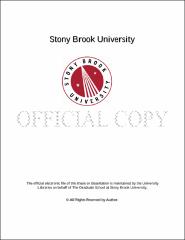| dc.identifier.uri | http://hdl.handle.net/11401/77516 | |
| dc.description.sponsorship | This work is sponsored by the Stony Brook University Graduate School in compliance with the requirements for completion of degree. | en_US |
| dc.format | Monograph | |
| dc.format.medium | Electronic Resource | en_US |
| dc.language.iso | en_US | |
| dc.publisher | The Graduate School, Stony Brook University: Stony Brook, NY. | |
| dc.type | Thesis | |
| dcterms.abstract | Social media is rapidly becoming more prevalent in modern society. Businesses, politicians, and educators are using social media as an increasingly important tool of communication and information. In my thesis, I examine the implications of the growing importance of social media on young adult authors and the way that literacy is perceived. While social media is often seen as existing purely for entertainment, many educational professionals are bringing aspects of social media into classrooms as instructive and informational tools. Through close examination of the works of John Green and his activities on social media, this thesis addresses the ways in which social media has contributed to the role that young adult authors play in their adolescent audiences’ developments and the ways that young adult authors can help guide their audiences to have positive, productive interactions with social media and with each other. | |
| dcterms.abstract | Social media is rapidly becoming more prevalent in modern society. Businesses, politicians, and educators are using social media as an increasingly important tool of communication and information. In my thesis, I examine the implications of the growing importance of social media on young adult authors and the way that literacy is perceived. While social media is often seen as existing purely for entertainment, many educational professionals are bringing aspects of social media into classrooms as instructive and informational tools. Through close examination of the works of John Green and his activities on social media, this thesis addresses the ways in which social media has contributed to the role that young adult authors play in their adolescent audiences’ developments and the ways that young adult authors can help guide their audiences to have positive, productive interactions with social media and with each other. | |
| dcterms.available | 2017-09-20T16:52:51Z | |
| dcterms.contributor | Dunn, Patricia A. | en_US |
| dcterms.contributor | Galante, Nicole | en_US |
| dcterms.creator | Pond, Jessica | |
| dcterms.dateAccepted | 2017-09-20T16:52:51Z | |
| dcterms.dateSubmitted | 2017-09-20T16:52:51Z | |
| dcterms.description | Department of English | en_US |
| dcterms.extent | 41 pg. | en_US |
| dcterms.format | Monograph | |
| dcterms.format | Application/PDF | en_US |
| dcterms.identifier | http://hdl.handle.net/11401/77516 | |
| dcterms.issued | 2016-12-01 | |
| dcterms.language | en_US | |
| dcterms.provenance | Made available in DSpace on 2017-09-20T16:52:51Z (GMT). No. of bitstreams: 1
Pond_grad.sunysb_0771M_13138.pdf: 243924 bytes, checksum: 8aebd2faab5742784ea8fa1082a43284 (MD5)
Previous issue date: 1 | en |
| dcterms.publisher | The Graduate School, Stony Brook University: Stony Brook, NY. | |
| dcterms.subject | English literature | |
| dcterms.title | From Text to Screen: John Green and the Rise of Digital Literacy | |
| dcterms.type | Thesis | |

